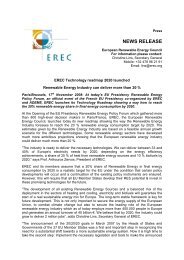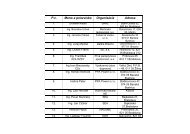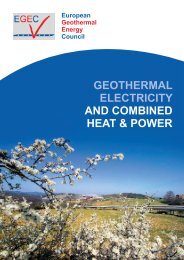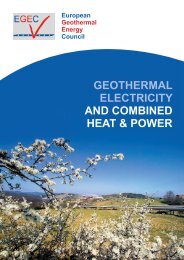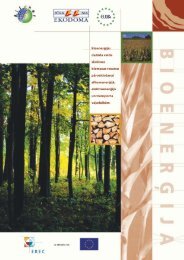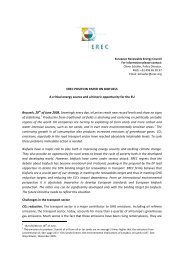CTO Assessment - European Commission
CTO Assessment - European Commission
CTO Assessment - European Commission
You also want an ePaper? Increase the reach of your titles
YUMPU automatically turns print PDFs into web optimized ePapers that Google loves.
INGALINA - DIDZIASALIS<br />
Biofuel Boiler House and<br />
District Heating<br />
Contact: Ms Gudrun Knutsson • Swedish Energy Agency • Box 310 310 • SE SE-631 04<br />
Eskilstuna • Sweden • Tel: +46 16 544 20 72 • Fax: +46 16 544 22 64/20 99<br />
E-mail: gudrun.knutsson@stem.se • website: www.stem.se<br />
Ignalina and Didziasalis are neighbouring<br />
towns on the Northeastern part of Lithuania<br />
in the Utena region, relying upon heat supplied<br />
from biomass. The biofuel boiler installation<br />
and district heating projects are part of<br />
Sweden’s International Climate-Related Energy<br />
Program. The Ignalina project was implemented<br />
in 1999 and the Didziasalis project<br />
followed the example of it’s success in 2001.<br />
Main aims and motivations<br />
Ignalina: The regional administration wished<br />
to reduce the use of heavy fuel oil (mazout)<br />
and to start to use local fuel as biomass.<br />
Didziasalis: The district heating system was<br />
installed in the 1980’s to support the building<br />
material industry. When the industry was<br />
closed down in the early 1990’s the heating<br />
system became inefficient to heat the remaining<br />
buildings in the town due to it’s high production<br />
costs, being designed to supply a larger<br />
market than was actually needed. Following<br />
Swedish Energy Agency (STEM)’s financing<br />
of the first Ignalina project, Ignalina regional<br />
council turned to STEM for some financial<br />
support in the restructuring of the heating<br />
system in Didziasalis.<br />
Project details<br />
The Ignalina project concentrated heat production<br />
into one newly renovated, already existing<br />
boiler house and closed down two old<br />
boiler houses. Mazout, with a lower level sulphur<br />
content, will still be used but to a far<br />
lesser degree for peak load and reserve capacity<br />
instead of the previous 60% of supply.<br />
The Ignalina project includes the installation<br />
Ignalina<br />
Energy MWh/y<br />
of new pre-insulated pipeline of 300 meters<br />
to connect the existing networks as well as 30<br />
new substations in buildings and block centers.<br />
In Didzaiasalis a new more cost effective boiler<br />
house was built nearer the town. Furthermore<br />
the distribution system has been partly renovated<br />
and 43 substations installed.<br />
Overall evaluation<br />
Ignalina regional administration fulfilled the<br />
aim to reduce the use of heavy fuel oil (Mazout)<br />
and to start using local fuel as biomass to<br />
create local employment and adhere to stricter<br />
environmental rules that came into force in<br />
1999 from the Lithuanian government.<br />
Biofuel is expected to replace 2,300 tonnes of<br />
Mazout for each project. The energy saving<br />
from the pipeline and substation networks<br />
amount to 1000 MWh/y per project.<br />
Recently Ignalina town inagurated further<br />
biofuels boilers in the same boilerhouse as the<br />
first project. This means that the heat supply<br />
in the whole town and practically the whole<br />
surrounding Ignalina region is based on woodfuel.<br />
Enabling factors<br />
Both projects received financial support from<br />
STEM in the form of loans. The Didziasalis<br />
project also received 50% of costs from the<br />
Lithuanian government. Ignalina has 6 different<br />
suppliers of biomass so there is now<br />
possibility of price competition.<br />
Challenges<br />
All municipal heating plants and distribution<br />
networks were decentralized in 1997 and<br />
Didziasalis<br />
Biofuel 25,000 145,000<br />
Mazout 10,000 1,500<br />
Reductions<br />
CO 2<br />
8,112 t/y 6,300 t/y<br />
SO 2<br />
123 t/y 50 t/y<br />
No x<br />
3 t/y 5 t/y<br />
many municipalities became shareholders in<br />
district heating companies. This caused problems<br />
as big towns and smaller communities<br />
had different requirements. Further reorganization<br />
took place and municipalities took over<br />
the direct management and responsibilities of<br />
the heating companies in their area. This can<br />
cause credit problems, as most lenders normally<br />
require a 5-6 year economic result history<br />
before providing loans. STEM was prepared<br />
to take the risk here as state guarantee<br />
was provided but this is only the case for few<br />
regions.<br />
Replication Potential<br />
The population is quite evenly spread out which<br />
is important for the implementation of biofuels<br />
projects. Therefore the conclusions of the<br />
Ignalina project will contain valid insights for<br />
Lithuania in general. Biofuel resources in the<br />
country are good and the technology is available,<br />
nearly every municipality has a District<br />
Heating system installed that could be renovated<br />
and reworked to make it more efficient<br />
and utilize biofuels.<br />
Change in perception of implementing<br />
RES projects<br />
It was easier to implement the Didziasalis<br />
project as financing was sought from the same<br />
source as for the Ignalina project.<br />
The Lithuanian authorities assert that the<br />
projects have played a role in the early introduction<br />
of RES into the country.<br />
RES Increase<br />
The savings caused by the plant from 1998<br />
to 2000 in Ignalina alone are as follows:<br />
Expenses from heat energy production<br />
in the company decreased by 26.5%<br />
Total heat energy costs per unit were<br />
decreased by 17.7%<br />
Expenses for fuel import were decreased<br />
by 93.4% due to the fact that all the<br />
biofuel is produced locally in contrast<br />
with the imported fossil fuels.<br />
<strong>CTO</strong> - Showcase<br />
81




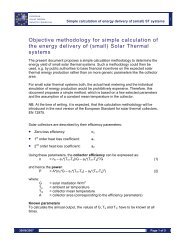
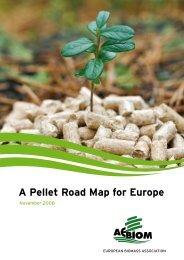
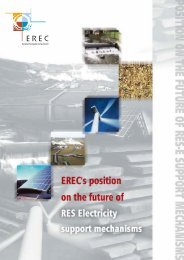

![Energy [R]evolution - Greenpeace](https://img.yumpu.com/47174859/1/184x260/energy-revolution-greenpeace.jpg?quality=85)
